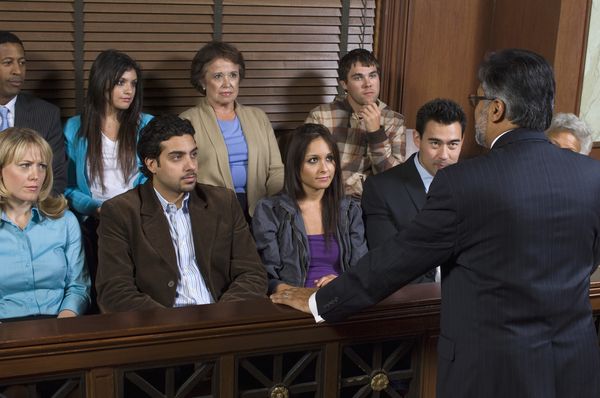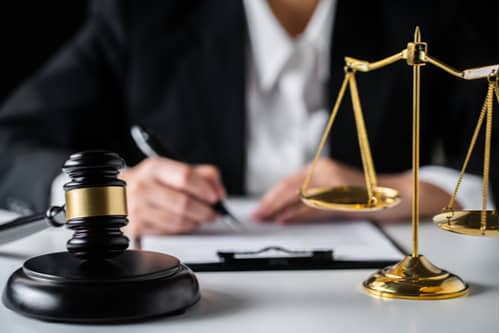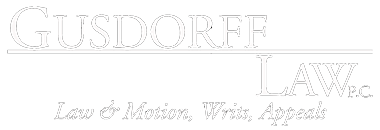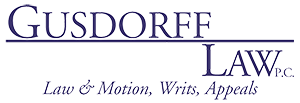- Appellate Litigation
Cases don’t always end when the court makes a judgement. If the court’s decision was made in error, it may be possible to reverse that decision through appeal.
Not only does this allow you to appeal an unfavorable decision, but it also means that another party could reverse a judgement that favors you. Gusdorff Law is a respected and trusted law firm that can provide unparalleled assistance a Appellate Litigation in Irvine.
What Is Appellate Law?
If a lower court applies the wrong legal standard or rules to a case, or if the court makes another decision contrary to the applicable statutes or case law, it is possible to challenge that opinion in a higher court. This process is known as appellate law.
During the appeal process, the lower court’s decision is reviewed by a higher court. The appellant submits a written argument called a brief that explains the error or errors made by the lower court.
It’s the duty of the appellant to explain why the lower court’s decision should be changed or overturned.
The purpose of appellate process isn’t to retry cases. When a case is appealed, no new evidence is presented, and no new witnesses are called. Instead, appeals rely on the written record of the lower court.
In order to successfully appeal a case, an appellant must show that the lower court made errors of law.
Even if an appeal is a success, that doesn’t necessarily mean that Appellate Litigation is over. If an appellant successfully shows that an error was made during a trial, the appellate court could send the case back to the trial court and order a new trial.
Judges in appellate court don’t decide if a party is guilty or liable. Instead, they review the decision and the procedures from the lower court.
How Is an Appellate Lawyer Different From a Trial Lawyer?
A trial lawyer’s job is to establish and prove the facts of a case. This is done by presenting evidence and examining witnesses. An appellate lawyer, however, focuses on what the law says. It’s their duty to show that the lower court made a legal error.
An appellate attorney specializes in appellate law. The rules of appellate court differ greatly from trial court. Lawyers must be able to look at cases objectively and see things from the perspective of the appellate court. The issues highlighted during appeal tend to be very different from the key issues at trial.
While trial lawyers focus on the facts of a case, appellate lawyers look at things from a different perspective. Because new evidence can’t be presented, they need to review the record of the case and consider the standards that will be applied by the court.
They need to be deeply familiar with the law so that they can identify errors that might make the court’s decision eligible for appeal.
During trial, there are many chances for an attorney to discuss the issues of a case. Appellate lawyers have fewer opportunities to make their case. The written and oral arguments presented by the attorney must be streamlined. Arguing facts is a waste of time; what matters here are the legal issues surrounding the case.
If you want to appeal a judgement, or if the judgement you won in civil court is being appealed, you need the help of an attorney that understands how to build an appellate case. The experts at Gusdorff Law can review the record of your case to see if errors were made.
If we do find issues, we’ll help you to appeal the decision and present that argument to the higher court.
What Can Be Appealed?
For a case to be appealed, it must meet three requirements. First, the party that is appealing the decision must have the right to appeal. Second, there must be grounds for appeal. Lastly, the appeal must be filed before the deadline to appeal has passed.
You have the right to appeal if you are an “aggrieved party.” This means that the lower court’s decision negatively impacted your interests or rights. In a civil case, both parties can appeal a judgement.
In a criminal case, only the defendant has the right to appeal.
To have cause for appeal, a legal mistake must have been made during the trial or judgement. Examples of grounds for appeal that an appellate judge might consider include:
- The judge applied the wrong legal standard to the case.
- There was an abuse of judicial discretion.
- The jury was given incorrect instructions.
- Evidence was improperly submitted.
- The defendant had ineffective counsel.
A notice of appeal can be filed after the entry of judgement. For civil cases involving less than $25,000, you have 90 days from the entry of judgement. For cases involving more than $25,000, you have 180 days from the entry of judgement.
In some cases, that deadline may be extended. For example, the timeline to file will be extended if there is a motion to vacate the judgement or if the trial attorney did not perform a duty related to the appeal.
Still, because the time to file is limited, it’s best to contact an appellate lawyer as soon as possible.
What Functions of the Appellate Process Does Gusdorff Law Handle?
Gusdorff Law can work with you you throughout every step of the appeal process and can even provide guidance before a case is appealed. We provide assistance with:
Briefs
Briefs are a written statement explaining the arguments being made in a case. Gusdorff Law has prepared many briefs for clients. We’ll create detailed briefs that effectively guide the appellate court through your trial case, explaining the errors that were made during trial.
Writ of Petition
While it’s not possible to appeal a trial court decision until after a judgement has been entered, it may be possible to file a writ of petition. Writs are similar to appeals, but they typically make an argument that can be presented in a standard appeal.
Writ petitions must be filed quickly, but they can also bring fast results. If we believe that a writ of petition is the best strategy for your case, we can handle your petition.
Oral Arguments
While oral arguments aren’t always part of an appeal, it’s possible to orally present arguments during an appeal hearing. This can be an opportunity to answer questions or to highlight the most important points of the brief.
If necessary, we can present oral arguments that will strengthen your appeals case.
Petition for Review
Once the appeal court has made a decision, it’s possible to request that the case be reviewed by a higher court. This is known as a petition for review. If the facts of the appeal’s court decision are being challenged, it may also be necessary to file a petition for rehearing.
f this motion is necessary, we’ll ensure that it’s filed as quickly as possible.
Pre-Trial Motions
Motions are documents that request the court to issue orders. Pre-trial motions are made before a trial begins. Examples include a motion to dismiss or a motion to block evidence or witnesses. Gusdorff Law can file all requisite motions on your behalf.
Trial and Post-Trial Motions
In addition to filing motions before a trial begins, Gusdorff Law can handle motions through a trial. In some cases, we may also be able to challenge the ruling in a post-trial motion before the case is appealed.
Some examples include a motion to vacate the court’s decision or a motion for a new trial. If you’re in need of post-judgement assistance, reach out to our firm as soon as you can.
Trial and Appellate Mediation Briefing and Representation
Resolving a care through the courts isn’t always the best option. Both trial and appellate courts can be difficult to predict. Trials and appeals can take a long time to resolve, and costs can be very high.
Because of this, settling a case outside the court through mediation is an option worth pursuing. If you are interested in mediation, Gusdorff Law can provide you with guidance and representation.
Opposition to Motions for Summary Judgement
Another way to resolve a case before trial is through a Motion for Summary Judgement. This motion requests that the court issue a judgement stating that there are not material factual disputes in the case.
This allows the court to decide the case as a matter of law. We can help you to oppose a motion for summary judgement.
What Types of Appeals Does Gusdorff Law Handle?
Gusdorff Law handles both California and federal appeals. Our firm has extensive experience with appellate litigation and takes on many types of appeals, such as:
Contact an Experienced Appellate Litigation Lawyer in Irvine.
If you’re looking for a reliable appellate litigation attorney in Irvine, Gusdorff Law can help. Our firm’s founder Janet Gusdorff has a strong command of the law and can provide an honest review of the legal merits of your case.
We can help you to hold onto a favorable trial court ruling or assist you if you want to appeal a decision. Call us today at 818-877-4515 so that you can get the representation you need.










